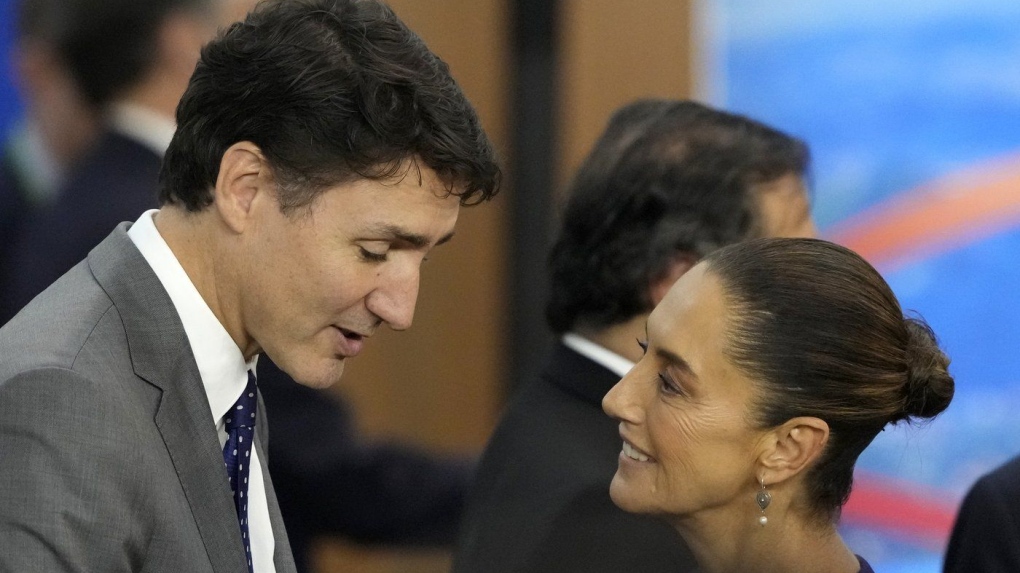Latest News
- Four years after Indigenous woman dies in Niagara Hospital, family still waiting for coroner's investigation
- Lawyer: British Columbia RCMP officer should be fired or resign immediately
- B.C. government looks to offer loan guarantees to property owners in Cowichan Aboriginal title area
- Uber driver's account in Toronto suddenly deactivated; only source of income cut off after 'duplicate account' claim
- TDSB education chief fired by provincial supervisor; sweeping changes at Canada's largest education board
Latest Ads
-
Jasmine Jewel
Call
-
Omidan group
Call
-
Amir Madanpour
Call
-
Dimo studio
Call
-
Yorkacademy
Call
-
Maryambagheri
Call
-
Shishlix Restaurant
Call

Fearing the loss of the US-Canada trade agreement, Mexico changes its rules and excludes Chinese parts
MEXICO CITY - Mexico has recently come under pressure for allegedly being used as a transit route for Chinese parts and products to North America, and officials are concerned that US President-elect Donald Trump or politically challenged Canadian Prime Minister Justin Trudeau will try to Remove Mexico from the US-Mexico-Canada Free Trade Agreement.
Mexico's ruling Morena party is so worried about losing the deal that President Claudia Sheinbaum announced Friday that the government is implementing a plan to encourage companies to replace Chinese parts with domestically made parts.
"We have a plan to replace those imports from China and have most of them produced in Mexico, either by Mexican companies or primarily by North American companies," Sheinbaum said.
Although Shinbaum claimed Mexico has been working on the effort since the global supply chain crisis of 2021, which brought factories around the world to a halt due to a shortage of parts, particularly Asian computer chips, it appears to be facing many challenges. Even the U.S., despite billions of dollars in incentives and subsidies, has had major problems getting chip production back on track.
Mexico gained tens of thousands of jobs as U.S. and foreign automakers moved factories to the country under the free trade agreement to take advantage of lower wages. But concerns that Chinese parts — or even complete cars — could use the deal to further undermine the U.S. auto industry have angered some north of the border.
For this reason, Mexico is trying to transfer the production of parts to this country in cooperation with private companies.
"Next year, God willing, we will start producing chips in Mexico," Mexican Economy Minister Marcelo Ebrard said Thursday. Of course, these chips are not the most advanced yet, but we are starting to produce them here."
Mexico's ruling nationalist party, usually resistant to being seen as under American pressure, is already struggling in other ways.
The party is eliminating about six independent watchdog and watchdog agencies established by former presidents. This includes antitrust, transparency and energy regulators. Along with reforms requiring all judges to be elected by ballot, these measures have raised concerns in the US and Canada.
Under the agreement, countries are required to have certain independent institutions, in part to protect foreign investors. For example, these institutions can prevent the approval of a state-owned company's monopoly that could drive competitors out of the market.
Therefore, ruling party lawmakers are rewriting the proposed rules to precisely meet the minimum requirements accepted in the trade agreement.
"What that would do is create reforms that are almost exactly the same as what we have in the United States, to fix that," Eberard said.
This is part of a legal defense of the trade agreement that was signed in 2018 and ratified in 2019. Mexico hopes the rules of the deal will prevent the U.S. or Canada from simply leaving, especially when the deal comes up for review in 2026.
If a country is dissatisfied with the agreement during periodic reviews like 2026, there is a clause in the agreement that allows them to request a review every year to find a solution, Gabriela Siler, director of economic analysis at financial group Banco Base, said. remain in operation for a decade.
He added: "That means they cannot withdraw from this agreement until 2036. "I think they will have a tough time with Mexico in the 2026 review."
As with any marriage, when the agreement no longer works for one party, it may continue ineffectively for years, but this death will be gradual.
C. J. Mahoney, who served as deputy US trade representative in the first Trump administration, said at a meeting at the Baker Institute in Texas in September that the US would likely not scrap the trade deal. But with critics mounting, the renewal could be delayed for years.
"The cost of not renewing immediately is actually fairly low," he said. "I think the desire to push this back is going to be very strong."
Since many companies will not make large investments in production facilities without the certainty of an agreement, this could be a serious and even fatal blow to the agreement.
How much does Mexico really buy from China? Mexican officials say they import less Chinese parts and products than the United States. But considering the huge difference in economic size of the two countries, this argument is correct but weak.
In July, the United States imposed tariffs on steel and aluminum exported from Mexico that had been produced elsewhere, in an attempt to prevent China from avoiding import taxes by shipping goods from Mexico. The tariff includes 25 percent on steel and 10 percent on aluminum that is not melted or cast in Mexico.
Senator Sherid Brown, Democrat of Ohio, called for an end to Mexican steel imports and said: "The alarming increase in Chinese steel and aluminum entering the country through Mexico is unacceptable and a threat to American jobs, our economy and our national security."
Ultimately, Mexico may have to limit Chinese imports, but it won't be easy.
"Decreasing dependence on Chinese imports," says José María Ramos, professor of public administration at Northern Border College in Tijuana.
Suggested Content
Latest Blog
Login first to rate.
Express your opinion
Login first to submit a comment.
No comments yet.


































